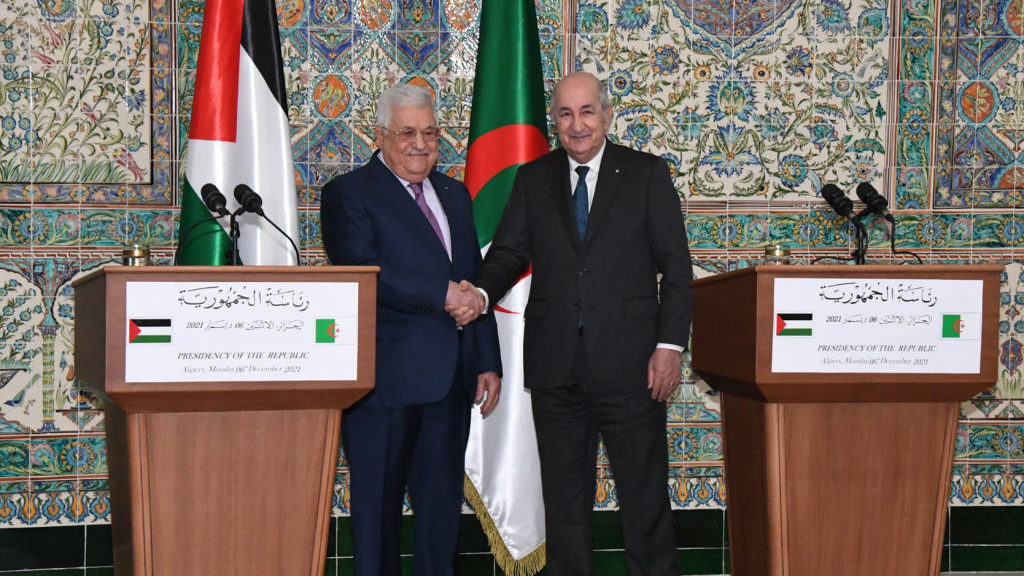Algeria To Host Palestinian Factions for Reconciliation Talks
But if the gaps don’t narrow first, Algiers may delay or even cancel the conference, Gaza-based analyst says
[Gaza City] Amid low expectations, Palestinians’ eyes have turned toward Algeria as the North African nation prepares to host six factions for talks meant to strengthen positive dialogue between the parties and search for a breakthrough in the national reconciliation effort.
Representatives of the two largest parties, Fatah and Hamas, met with Algerian officials on Monday to prepare the way for national dialogue. Back on December 6, Algerian President Abdelmadjid Tebboune agreed with his Palestinian counterpart, Mahmoud Abbas, to host the conference.
The invited parties are: Fatah, Hamas, Islamic Jihad, the Popular Front for the Liberation of Palestine (PFLP), the Democratic Front for the Liberation of Palestine (DFLP) and the Popular Front for the Liberation of Palestine-General Command (PFLP-GC).
The initiative has been widely welcomed.
Abdel Latif al-Qanou, Hamas’ spokesperson, hailed the Algerian effort, calling it “a chance to rearrange the internal Palestinian house” and confirming to The Media Line his movement’s willingness to cooperate and end the Hamas-Fatah division.
Many efforts by different actors, such as Cairo, Doha, Senegal, Moscow and others, have failed in the past to end the rift between the two rival movements. Algeria can face the same failure if the political will of all parties continues to be lacking
“We seek partnership with all Palestinian components to achieve national unity based on clear and fair standards. That’s why inclusive elections, including national, presidential and legislative, must take place as a start,” Qanou said.
Political analyst Hussam al-Dajani told The Media Line that it is not impossible that Algeria will be able to set things right but, he added, the reality is difficult and complicated.
“Many efforts by different actors, such as Cairo, Doha, Senegal, Moscow and others, have failed in the past to end the rift between the two rival movements. Algeria can face the same failure if the political will of all parties continues to be lacking,” Dajani said.
Obstacles to Palestinian reconciliation include the two largest movements’ disagreement on many issues, the most prominent of which are related to overdue Palestinian Authority legislative and presidential elections; the mechanism for holding elections to the Palestinian National Council – the legislative body of the Palestine Liberation Organization – and how to distribute its seats; as well as issues related to PA employee salaries and the sanctions imposed by the PA on Gaza since March 2017.
Algeria is aware of the difficulties and knows how deep the gap is between the two dominant parties, Dajani said.
“Inviting Palestinian factions separately and discussing their various views reflects the Algerians’ insightful strategy and vision,” he said. “In my estimation, if the gap between the rivals remains huge and no significant convergence in discussions appears, then the Algerian leadership will probably delay the whole dialogue or even cancel it entirely.”
Given the decade-long political estrangement and the geographical separation between Gaza and the West Bank, achieving significant progress in the coming meetings will probably be a tough task.
“Hamas is the one who should take the first step in ending the division because it’s the one who controls the Gaza Strip and its governmental bodies,” Mundher al-Hayek, a leading member of Fatah, told The Media Line.
“Based upon the 2017 agreement that we [Fatah and Hamas] signed, a national unity government should be formed. If Hamas agrees to hand over responsibilities and ministries in Gaza, then this will be the first step to end the division and solve all outstanding issues,” he added.
Dajani said that, for many reasons and despite the many barriers ahead, the chances to reach that goal remain high.
“The good and friendly Palestinian-Algerian relations constitute an important historic asset, especially since Algeria is on good terms with all Palestinian parties and stands at the same distance between them. Moreover, the normalization waves and the deterioration of the Palestinian national project in relation to the Zionist one are strong factors exerting pressure to move on with the reconciliation process,” he noted.
The Palestinian public, however, is not so optimistic about the factions’ meeting.
Hani Merdi, a resident of Gaza, told The Media Line: “We’ve seen this scenario hundreds of times before. I expect they will come back without any results, as usual. The problem, in my opinion, does not lie in the points of disagreement, because they will never get along anyway.”
“The entire system needs to be changed and all these hypocrites must go. This is the only way to move forward,” he said.


